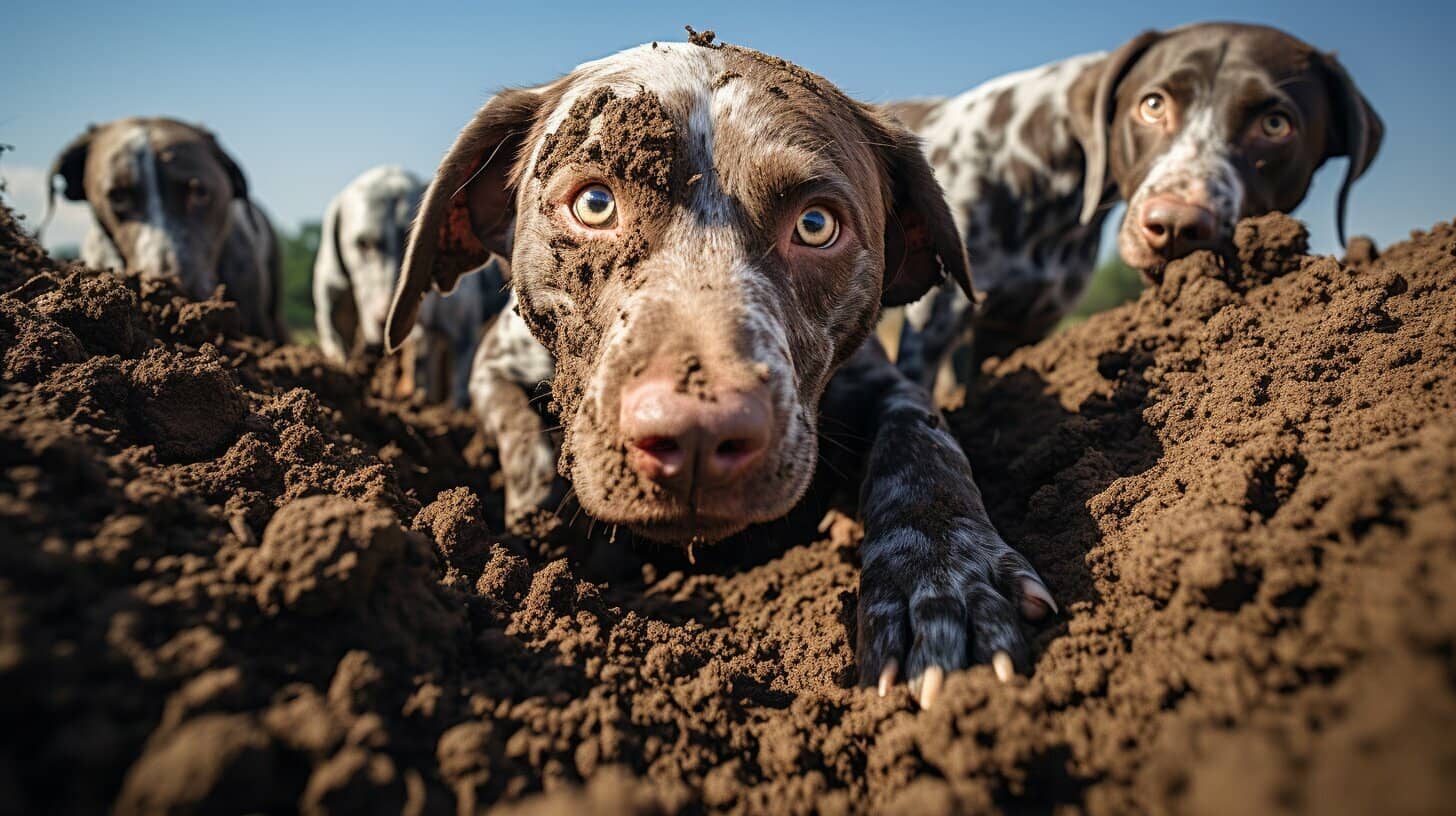It’s not uncommon for dog owners to catch their furry friends gobbling up dirt from time to time. While it may seem odd and concerning, the truth is that dogs have a natural instinct to eat dirt and other non-food items. But why exactly do they do it? In this article, we’ll explore the reasons behind this strange behavior and what you can do to prevent your pooch from indulging in this unusual habit.
Why Do Dogs Eat Dirt?
It’s a common sight to see dogs digging around the garden or backyard and treating themselves to a mouthful of dirt. At first, it may seem puzzling why dogs would eat dirt when they have access to a variety of food and treats. However, there are several reasons why dogs exhibit this peculiar behavior.
Instinctual Reasons for Dogs Eating Dirt
Dogs evolved from wolves, who would often consume dirt, grass, and other vegetation in the wild. This behavior served multiple purposes, such as aiding in digestion and expelling unwanted parasites from their system. Even though dogs are now domesticated animals, they still retain some of these wild instincts and may eat dirt as a way to supplement their diet.
Additionally, dogs have a keen sense of smell and are attracted to scents that we may not even notice. Sometimes, dirt may contain smells that dogs find appealing, and they may consume it out of curiosity or to satisfy their natural urges.
Behavioral Reasons for Dogs Eating Dirt
Another reason why dogs may eat dirt is due to behavioral factors. Boredom, stress, and anxiety can cause dogs to engage in destructive behaviors, such as digging and chewing on items they shouldn’t. Eating dirt may be a way for dogs to pass the time and alleviate their stress levels.
In some cases, dogs may also eat dirt as a way to seek attention from their owners. If a dog isn’t receiving enough attention or is feeling neglected, they may engage in odd behaviors as a way to gain attention from their owners.
It’s essential to monitor your dog’s behavior and provide them with enough mental and physical stimulation to prevent them from engaging in destructive behaviors out of boredom or stress.
Instinctual Reasons for Dogs Eating Dirt
While it may seem strange to humans, dogs have a natural instinct to eat dirt. This behavior can be traced back to their ancestors in the wild, who would eat dirt and other natural materials to supplement their diets with minerals and other nutrients.
Additionally, dogs may eat dirt as a way to relieve digestive discomfort or even anxiety. Some dogs may also simply enjoy the taste or texture of dirt, as strange as it may seem to us.
How to Address Instinctual Reasons
It is important to keep your dog’s nutritional needs in mind when addressing their instinctual urge to eat dirt. Providing a well-balanced diet with appropriate minerals and nutrients can help reduce the likelihood of your dog seeking these nutrients from other sources, such as soil.
If your dog is eating dirt due to digestive discomfort or anxiety, it is important to address these underlying issues. Consult with your veterinarian to determine the best course of action for your dog’s individual needs.
Behavioral Reasons for Dogs Eating Dirt
While instinctual reasons can explain why dogs may eat dirt, it’s important to consider behavioral factors as well. These reasons include:
- Boredom: Dogs who lack stimulation and haven’t been provided with enough toys or activities may resort to eating dirt as a way to alleviate their boredom.
- Anxiety: Dogs who are anxious or stressed may experience relief from chewing and eating dirt. This behavior can become a habit and may require professional intervention to address the underlying anxiety.
If your dog is exhibiting behavioral reasons for eating dirt, it’s important to provide them with enough stimulation and seek help from a veterinarian or animal behaviorist to address any underlying anxiety.
The Importance of Behavioral Training
Behavioral training is crucial for ensuring your dog has the tools they need to cope with boredom, anxiety, and other behavioral issues. Providing them with enough exercise, toys, and mental stimulation can also help reduce the likelihood of them eating dirt.
The Risks of Dogs Eating Dirt
While it may seem harmless, dogs eating dirt can actually pose some risks to their health. Here are some possible dangers:
| Risk | Description |
|---|---|
| Digestive Problems | Eating dirt can cause an upset stomach, vomiting, and diarrhea. |
| Intestinal Blockage | Ingesting large amounts of dirt or rocks can cause a blockage in the intestines, which may require surgery. |
| Toxic Substances | If your dog eats potting soil, it may contain fertilizers, pesticides, or other chemicals that can be harmful if ingested. |
If you suspect your dog has ingested anything toxic or is displaying signs of digestive discomfort, contact your veterinarian immediately.
It’s important to keep an eye on your dog and discourage them from eating dirt to prevent any potential health issues.
How to Prevent Dogs from Eating Dirt
If you’ve noticed that your dog has a habit of eating dirt, there are a few things you can do to prevent them from doing so. Here are some tips:
1. Keep Your Yard Clean
Make sure to regularly clean up your yard and remove any trash or debris that may be present. This will reduce the likelihood of your dog finding something to eat. Also, try to keep your grass trimmed and free of weeds, as some dogs may be attracted to certain plants.
2. Provide Plenty of Exercise and Mental Stimulation
Dogs that are bored or under-stimulated may be more likely to eat dirt as a way to occupy themselves. Make sure to provide plenty of exercise and mental stimulation through activities like walks, playtime, and puzzle toys. Consider enrolling your dog in obedience or agility classes.
3. Provide a Balanced Diet
Make sure your dog is getting a balanced and nutritious diet. In some cases, dogs may eat dirt as a way to supplement missing nutrients in their diet. If you’re concerned that your dog may not be getting all the nutrients they need, consult with your veterinarian.
4. Train Your Dog
You can train your dog to stop eating dirt with positive reinforcement training. When you catch your dog trying to eat dirt, redirect their attention to a toy or treat. Praise them when they focus on the toy or treat instead of the dirt. Consistency is key, so make sure to reinforce this behavior every time you catch your dog trying to eat dirt.
5. Consider a Bitter Spray or Deterrent
Some dogs may respond well to a bitter spray or deterrent applied to the dirt in the areas they frequent. These sprays have a bitter taste that can discourage your dog from eating dirt. However, make sure to choose a product that is safe for dogs and won’t harm your yard or plants.
Safe Alternatives for Dogs to Chew On
If you’re concerned about your dog eating dirt, it’s important to provide them with safe and suitable alternatives to chew on.
| Safe Chew Toys for Dogs |
|---|
| Kong toys |
| Nylabone chew toys |
| Rope toys |
| Antlers |
These toys can help satisfy your dog’s natural urge to chew and keep them occupied. It’s important to supervise your dog while they play with chew toys to ensure they don’t accidentally swallow any small pieces.
You can also provide your dog with rawhide chews, but be sure to choose ones that are made in the USA and do not contain any harmful chemicals.
If you’re looking for a more natural alternative, consider giving your dog raw bones. Raw meaty bones, such as chicken necks or beef bones, can provide your dog with essential nutrients and help keep their teeth clean.
Remember to always consult with your veterinarian before giving your dog any new toys or treats.
Common Myths About Dogs Eating Dirt
There are many myths about why dogs eat dirt. Some owners believe that their dogs eat dirt to supplement their diet, while others think that it’s a sign of illness. Here are some common myths about dogs eating dirt that you should know:
- Myth #1: Dogs eat dirt because they are lacking nutrients in their diet. While this is possible, it is not always the case. In fact, most dogs eat dirt for other reasons.
- Myth #2: Eating dirt is always harmful to dogs. While there are risks associated with dogs eating dirt, it is not always dangerous. In some cases, it may just be a harmless behavior.
- Myth #3: Dogs eat dirt because they are bored. While boredom can lead to destructive behavior, it is not the sole reason why dogs eat dirt. There are many other factors to consider.
- Myth #4: It is safe for dogs to eat any type of dirt. This is not true. Certain types of dirt, such as potting soil, can be harmful to dogs if ingested.
- Myth #5: Eating dirt is a sign of an underlying health issue. While it is possible that a dog’s dirt-eating behavior could be linked to a health issue, it is not always the case.
It’s important to understand the truth about why dogs eat dirt so that you can properly address the behavior if necessary. Don’t believe everything you hear – always consult with a veterinarian for accurate information about your pet’s health and behavior.
FAQ about Dogs Eating Dirt
Q: Is eating dirt harmful to dogs?
A: Yes, eating dirt can be harmful to dogs. It can lead to digestive issues, intestinal blockages, and even toxicity if the dirt contains harmful chemicals or substances.
Q: Why do dogs eat dirt?
A: Dogs may eat dirt for a variety of reasons, including instinctual behavior, boredom, anxiety, or a nutrient deficiency.
Q: Can potting soil be harmful to dogs?
A: Yes, potting soil can be harmful to dogs if it contains fertilizers, pesticides, or other chemicals. It can also contain mold or bacteria that can cause infections.
Q: How can I prevent my dog from eating dirt?
A: You can prevent your dog from eating dirt by providing them with plenty of chew toys, ensuring their diet is balanced and nutritious, and keeping them mentally stimulated with exercise and training. It’s also important to supervise your dog when they’re outside and keep them away from areas where they may be tempted to eat dirt.
Q: Can I give my dog safe alternatives to chew on instead of dirt?
A: Yes, there are plenty of safe alternatives for dogs to chew on, including toys, bones, and dental chews. Make sure to choose products that are appropriate for your dog’s size and chewing habits, and always supervise them during playtime.
Q: Is it true that eating dirt can help dogs with upset stomachs?
A: This is a common myth. While some dogs may eat dirt to alleviate upset stomachs, it is not a safe or effective remedy. If your dog is experiencing digestive issues, it’s important to consult with a veterinarian for proper diagnosis and treatment.

